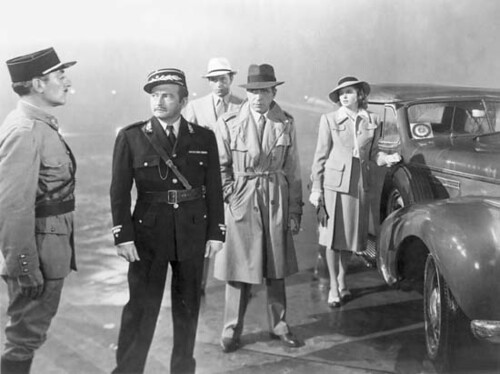Until Ilsa comes into the picture, Rick isn’t motivated by anything. He isn’t driven by money or girls or acquaintances. He found a place full of people whose lives have been broken as his has. It’s unclear what he wants or what drives him; however, we have no indication that he wants it any other way. He’s seems content with the way his life is, ordered and controlled. Ilsa brings memories of a different time; she’s a source of nostalgia of a better, more innocent time in his life. In the end, Rick lets Ilsa goes because he understands that his life with Ilsa was in a different time and place that could never be regained. Their relationship would never be what it was in Paris so he instead goes back to life as he knows it where he is in control and responsible to nobody, except now he wants to start again anew where he can erase any reminders.
Although this analysis completely ignores the macrocosm represented in the movie, it makes Rick seem more real. When looking from the ideal scenario which Hollywood may have intended, the plot and characters become cliché and ideal, many real aspects are taken away as all the characters decide to give their lives to the greater good which is fighting the Nazi’s. If a man were truly in love with a woman and believed she were in love with him, they would not have give one another up. Love is the most important emotion there is and if it were real they would have done anything for it because, ultimately, people are driven by personal incentives over the community good.


I love that you compare Rick's relationship with his employees and customers with gangsters. It is a great way to compare cool criminality and cool sacrifice. I think you are right, that two people who really love each other are not likely to let each other go that easily, but I guess it makes the movie what it is.
ReplyDeleteI like the talk of love near the end of this post. Do you feel like you can be in love and still be cool?
ReplyDeleteI like your analysis of the film's realism, especially when it comes to Rick and Ilsa's relationship. I agree that two people who are seriously as in love as they are supposed to be would be so self-sacrificing, but I kind of wonder if Rick really does love Ilsa. Maybe he idealizes her more than he actually loves her? Rick and Ilsa's relationship a good point to bring up, and I don't think that it gets examined enough when it has the more overt tones of the film to contend with. Awesome post!
ReplyDeleteI see your point about ignoring the macrocosm and focusing on the people in the characters, but is it completely fair to do that? Can we truly understand Rick and Ilsa without understanding how what they meant? You try to take them out of this context, but if that context is built into their characters, can you really take them out?
ReplyDeleteYou bring up some excellent points in your post. Don't be afraid to follow things to their conclusions, regardless of length.